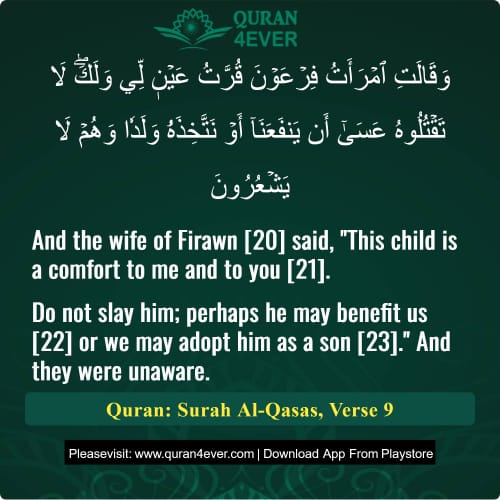
Transliteration:( Wa qaalatim ra atu Fir'awna qurratu 'aynil lee wa lak; laa taqtuloohu 'asaaa aiyanfa'anaa aw nattakhizahoo waladanw wa hum laa yash'uroon )
"And the wife of Firawn [20] said, 'This child is a comfort to me and to you [21]. Do not slay him; perhaps he may benefit us [22] or we may adopt him as a son [23].' And they were unaware."
The wife of Firawn, known for her righteousness, intervened with compassion and wisdom. Unlike her tyrant husband, she was touched by the sight of baby Musa and played a key role in sparing his life.
She described the child as a comfort (qurrat ‘ayn)—a source of peace and joy. Her words softened Firawn’s stance, showing how Allah used mercy within the palace to protect Musa.
She suggested that Musa might bring benefit—perhaps in service or blessings—planting a non-threatening reason to keep him alive. This shows how Allah’s plan unfolded through simple words with deep consequence.
She offered adoption as another possibility, framing it as personal gain for the royal family. Ironically, this act of kindness led to their undoing, for they were unaware that this child would grow to confront and defeat them.
The tafsir of Surah Qasas verse 9 by Ibn Kathir is unavailable here.
Please refer to Surah Qasas ayat 7 which provides the complete commentary from verse 7 through 9.
(28:9) The wife of Pharaoh said: “Here is a delight of the eye to me and to you. Do not kill him. Maybe he will prove useful for us, or we may adopt him as a son.”[12] They were unaware of the end of it all.
12. What one understands from this is briefly so: When the ark or the basket was carried by the river to the place where Pharaoh’s palaces were situated, the servants of Pharaoh picked it up and took it before the king and the queen. It is just possible that the king and the queen were at that time strolling along the river bank and might have noticed the basket and ordered it to be picked up. When they saw a child in it, they could easily guess that it belonged to an Israelite family. For it came from the quarters inhabited by the Israelites, whose sons were being put to death in those days. It was understood that somebody had hidden the child for some time but when it could not be hidden any longer, it was cast to the river in the hope that it might be picked up and rescued from death. With this in view, the most obedient servants submitted that the king order the child to be killed forthwith, for it might prove dangerous for him. But the Pharaoh’s wife was a woman and might even be childless. Then it was a lovely child, as Allah has reminded Moses in Surah Ta-Ha: Ayat 39, thus: “I had cast on you love from Myself.” That is “I had made you such a lovely child that the beholders could not help but love you.” Therefore, the woman could not keep their feelings for him, and said to the king, “Do not kill him, but let us adopt him. When he grows up in our house as our son, he will not know that he was an Israelite: he will rather think he is one of Pharaoh’s own kinsfolk, and he will be useful for us as against the Israelites.”
According to the Bible and the Talmud, the woman who had counseled adoption of Moses was Pharaoh’s daughter, but according to the Quran his wife (imraat-u-Firaun). Obviously, the direct word of Allah is more reliable than the verbal traditions which were compiled centuries afterwards. Therefore, it is absolutely needless to translate imraat-u-Firaun as a woman of Pharaoh’s family against the Arabic idiom and usage only for the sake of seeking conformity with the Israelite traditions.
[1095]- What would be the result of that.

For a faster and smoother experience,
install our mobile app now.
Related Ayat(Verses)/Topics